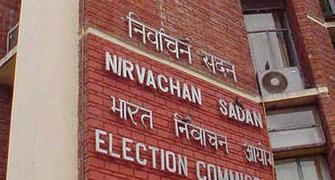In an action replay after seven years, Mukesh Ambani-promoted Reliance Industries, India's largest company by market capitalisation, announced on Friday, plans to merge its group firm Reliance Petroleum with itself.
Both RIL and RPL informed the Bombay Stock Exchange on Friday that they would hold separate board meetings on March 2 to consider the merger.
RIL's existing refinery was earlier under a separate company, also named Reliance Petroleum. This company, which started operations in FY01, was merged with RIL with effect from March 2002.
If the latest merger is approved by the boards, the m-cap of the combined entity will be Rs 2,33,000 crore, which is 35 per cent more than that of the National Thermal power Corporation, the second-largest company by m-cap at today's closing price on the BSE.
The merger decision was announced after the close of trading hours. RIL fell 1.97 per cent to Rs 1,265.05 and Reliance Petroleum dropped 1.23 per cent to Rs 76.20.
The merger would catapult RIL among the world's 50 most profitable companies; top 10 non-state owned refining companies; top 15 independent upstream companies and the fifth-largest producer of poly-propylene. The combined entity will have 1.24 million barrels per day refining capacity.
After months of speculation, US refining major Chevron has decided to exit RPL. In a late night release on Friday, RIL announced it will purchase the 5 per cent stake that Chevron held in RPL, constituting 225 million shares.
The stake was held by Chevron India Holdings Pte Ltd, Singapore, a wholly-owned subsidiary of Chevron. It had acquired the stake in April 2006 at Rs 60 a share. RIL will purchase the shares at the same price, in sync with an agreement reached between them. This will raise RIL's stake in RPL to 75.38 per cent.
Analysts said Chevron's continuance in RPL made little sense after RIL's decision to merge RPL with itself. Chevron invested in RPL primarily because of refining.
According to the equity investment agreement, RPL and Chevron were to enter into crude supply and product off-take agreements. Chevron was also expected to up its stake in RPL to 29 per cent by July this year.
As on December 2008, promoters hold 49 per cent stake in RIL and 70.38 per cent in RPL.
Analysts expected the merger ratio to be in the band of 16 RPL shares for one RIL share to 19 RPL shares for an RIL share.
Reacting to the announcement, the government said it did not see any immediate issues with the merger proposal. "There should be no legal issues," Petroleum Minister Murli Deora said in New Delhi.
"The merger will not affect the export-oriented unit status of Reliance Petroleum," Commerce Secretary G K Pillai said.
Analysts said the merger could have been triggered by operational and tax benefits. RIL would save on transfer pricing on use of K-G Basin gas and other related products. It would also save on taxes to be paid arising out of the transfer resulting in about $1-1.5 for every barrel of crude processed, analysts said. The savings would occur at a time when refining margins were under pressure because of a slump in oil prices, analysts added. Kamlesh Kotak, head, Asian Market Securities, said the move was seen as bailout for the troubled RPL, which was facing difficult market conditions and would not be profitable for another two to three years.
"The merger will lead to equity dilution of 4.23 per cent to 5.29 per cent of the equity capital for RIL, depending upon the ratio (after considering the 70.38 per cent holding by RIL in RPL that will get cancelled)," he added.
Sources close to the company said the deal was mainly to enhance RIL's position as an integrated energy major. The markets generally ascribed higher valuation to integrated energy companies compared to standalone refineries due to better competitive position and reduced earnings volatility, they added. The merger will also enhance RIL's weight in domestic indices. RIL will also gain significantly from higher financial strength and flexibility from the merger, which is likely to be earnings accretive for RIL from the first year itself.
Some analysts said RPL shareholders would benefit in the long term from the merger with RIL because it could gain from RIL's other diversified businesses. Analysts were not surprised with the latest move as all of RIL's subsidiaries involved in refining or petrochemicals in the past had eventually been merged with RIL. Back in 2002, when RPL was merged with RIL, the swap ratio was fixed at 1:11, that is for every one share of RIL, 11 RPL shares.








